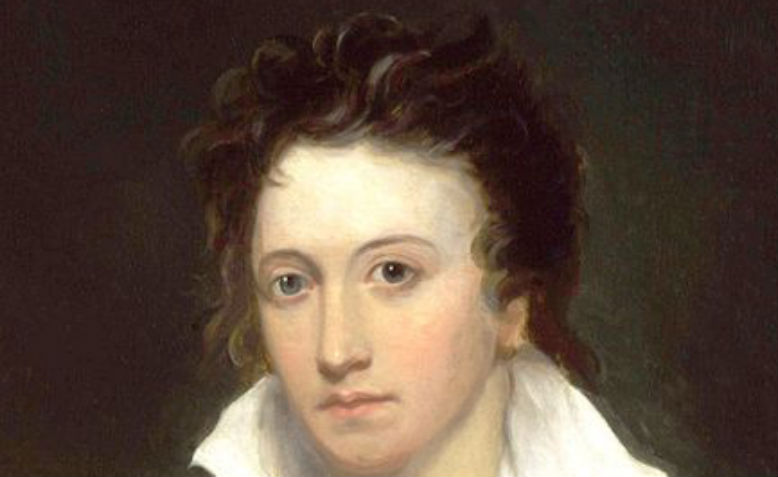 Percy Bysshe Shelley, painted by Alfred Clint. Image: Wikimedia Commons
Percy Bysshe Shelley, painted by Alfred Clint. Image: Wikimedia Commons
A look at the radical history of the poem the Labour leader quoted at Glastonbury
This weekend, as he had throughout his election campaign, Jeremy Corbyn invoked the words of Percy Bysshe Shelley, this time to a crowd of thousands at Glastonbury festival. Here, Jacqueline Mulhallen, author of Percy Bysshe Shelley: Poet and Revolutionary, looks at the radical political history of ‘The Mask of Anarchy’, the poem Corbyn quotes, and examines the dialogue between Corbyn and Shelley’s activism.
At the end of the election campaign on June 7, 2017, Jeremy Corbyn gave a speech in Islington which ended with his quoting the following stanza:
Rise like lions after slumber
In unvanquishable number
Shake your chains to earth like dew
Which in sleep have fallen on you –
Ye are many, they are few.
Some of the enormous crowd listening joined in with the last line. ‘You should never be afraid of saying you like poetry’, Mr. Corbyn said. And certainly not this poem. It was Shelley’s “The Mask of Anarchy”, the most famous and popular political poem in English. The Labour party had been using a modified form of the last line as their election slogan, ‘For the many, not the few’.
In the early 1990s, the Poll Tax campaigners used the line ‘We are many, they are few’ as their slogan. The poem was recited in 1989 by the students occupying Tiananmen Square, and in 2011 by those in Tahrir Square. It gave the title to Amir Amirani’s great film of the Stop the War demonstration in 2003. Further back, it was chanted by the garment workers of New York in 1909, mostly young immigrant women, striking for better pay and conditions (they won), and shortly afterwards, during World War I, Olive Waterman, a young member of Sylvia Pankhurst’s East London Federation of Suffragettes, used to draw crowds in Victoria Park by reciting Shelley. It has long been a part of working class consciousness. Shelley’s Queen Mab was known as the ‘Chartist’s Bible’ and Engels told Eleanor Marx that they all knew Shelley by heart back then’. It may well have been The Mask of Anarchy that they knew at the very least.
Shelley wrote the poem in 1819. Although he was living in Italy at the time and had given up political activism for poetry, he kept in touch with leftwing political thought in England by reading Cobbett’s Register and The Examiner, edited by his friend, Leigh Hunt. A perfectly legal and peaceful meeting of Manchester workers, gathered in St Peter’s Fields to hear Henry Hunt (no relation to Leigh) talk about his ideas for reform of Parliament, was attacked by a troop of militia men, not professional soldiers, who slashed at these men women and children, killing and wounding. Shelley’s friend Thomas Love Peacock, sent him all the papers with accounts of what became known as the ‘Peterloo Massacre’. The Mask of Anarchy was Shelley’s response.
It is a long poem in ballad form and it tells of a dream. A long procession of masked politicians led by the Foreign Secretary, the Prime Minister and the Lord Chancellor (the names are blank and we can fill in their modern equivalents). They are followed by ‘Anarchy’, for Shelley the capitalist system, but Anarchy is brought to a standstill by an amazing event. A young woman throws herself in front of the horses. Her name is Hope. Anarchy and his crew are defeated.
The central part of The Mask of Anarchy explains that ‘freedom’ is in fact the freedom of having sufficient to live on, education, comfort – all these questions were addressed in Labour’s manifesto. Shelley then goes on to suggest another demonstration
Let a vast assembly be
And with great solemnity
Declare with measured words are ye
Are, as God has made ye, free
At around the same time, Shelley wrote a number of other poems inspired by Peterloo and the essay A Philosophical View of Reform, in which he pointed out that the reform of Parliament sought by Hunt and others would not be sufficient to improve the conditions of the workers, who, he says, are ‘ill-fed, ill-clothed and ill-educated’. It is capitalism that Shelley is criticising, and this at a time when the industrial revolution was just beginning and the working class was not yet ‘made’. The parallels with today could not be clearer. Workers are so ill-fed that some resort to food banks. They are housed in tower blocks with no protection against fire. Education cuts, constant examinations (the SATS) and the introduction of university fees have destroyed the education system. Yet he could see that the workers had the solution in their hands. Many people have said that Jeremy Corbyn has given them Hope.
The publishers to whom Shelley sent his poems did not dare to publish them, although in 1832, when the movement for the reform of Parliament looked like succeeding, Leigh Hunt at last published The Mask of Anarchy. Since then, it has been part of the consciousness of the working class movement, both on the streets and among revolutionary intellectuals like Marx and Engels, and The Mask of Anarchy has provided the key slogan of many campaigns. Paul Foot, the great journalist and campaigner and author of Red Shelley, talked about him at the annual Marxism events in London in the 1980s and 1990s.
In February 2003 a ‘great assembly’ took place – the huge anti-war demo in Hyde Park which echoed around the world in the first global protest. Jeremy Corbyn was one of the speakers on that occasion, and it is only fitting that he should turn to Shelley to give a voice to his campaign.
Percy Bysshe Shelley: Poet and Revolutionary by Jacqueline Mulhallen is available from Pluto Press.

